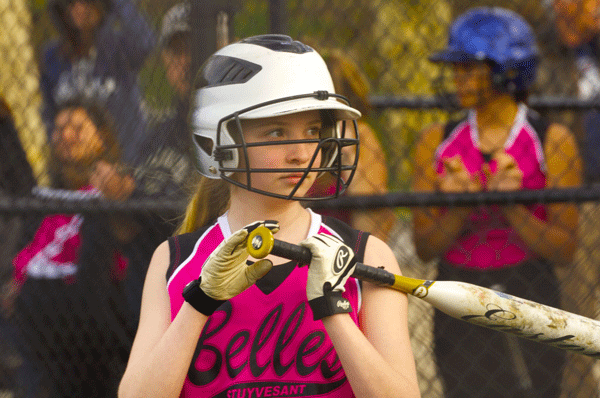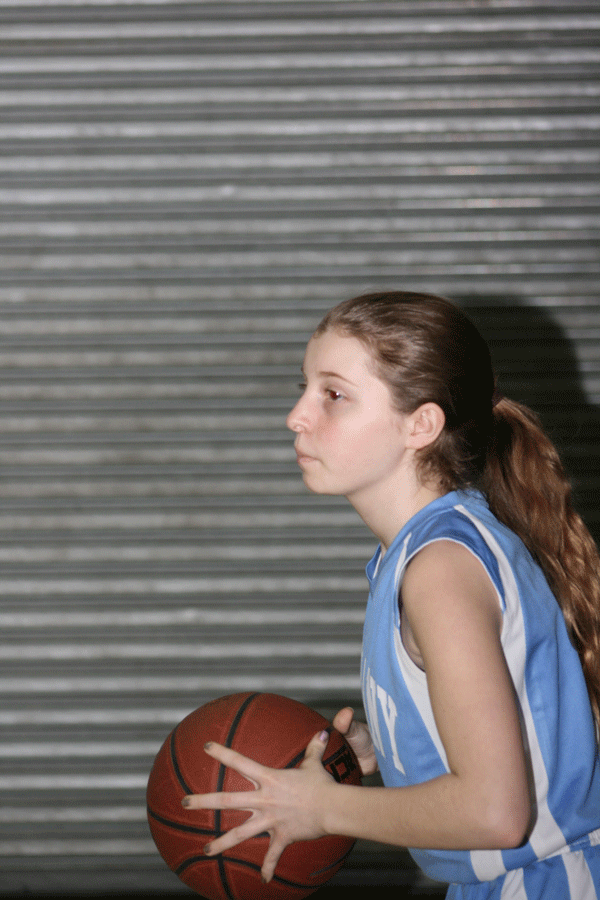
BY SCOTT STIFFLER | As a player of three sports and a member of six teams, it was sheer coincidence that Julianna Fabrizio was actually at home to come to the phone, and learn that she was a winner.
Competitive but compassionate, the 13-year-old student at West 17th Street’s NYC Lab Middle School for Collaborative Studies recently answered the call from online resource hub New York Sports Connection, whose contest asked 12- to 18-year-olds for short essays on the theme “What Sportsmanship Means to Me.” Awards were based on originality, emotional appeal, use of the theme, grammar and spelling, and writing skills appropriate for the author’s age.
A finalist in the eighth grade category, Fabrizio’s winning entry asked her contemporaries to embody notions of etiquette once the game clock stops ticking. “Why is it,” she wondered, “that it’s very respectable to talk of sportsmanship on the basketball court, and expected of you, yet these unofficial rules don’t always carry through to our everyday lives?”
During a recent phone conversation with Chelsea Now, Fabrizio ticked off the list of her current athletic activities, which have been accumulating since the sixth grade. “The teams I play for,” she noted, “are the Peter Stuyvesant Little League Belles [softball], the Lab Gators [soccer and softball], the Epiphany Blue Jays [basketball], Steady Buckets [basketball], and Manhattan Kickers [soccer].”
Fabrizio’s winning variation on the contest theme came from patterns observed over time, while playing with school and citywide teams.

“It’s the little things,” she says of gender disparities that, while not addressed overtly in her essay, are very much part of the author’s appeal for an even playing field. “Sometimes people won’t pass the ball to a girl or cheer as hard for a girl. It’s especially important to me that girls are treated equally, just as everyone should be treated equally. And when you are a girl playing among girls, sometimes people will not give you the same respect they will give boys. So it’s important that all players respect everyone — on and off the court.”
Fabrizio is backing up that challenge by donating half of her $100 contest award to Steady Buckets (steadybuckets.org), a nonprofit that provides basketball skills training and academic support to NYC boys and girls, seven days a week. As for her essay, we’ve printed it below, in full. To access the work of all winners, finalists and honorable mentions, visit NewYorkSportsConnection.com.
Sportsmanship: On and Off the Court
BY JULIANNA FABRIZIO
When children are first taught to play sports, one of the first things they teach you is good sportsmanship. They tell you to pass the ball and always be nice to your teammates. But once you leave, sportsmanship is hardly ever mentioned. Coaches will tell you after a loss to leave those feelings on the court. However, a good amount of the time not only is the score left on the court, but so is the good sportsmanship that goes along with it.
Unfortunately, at basketball practice, they don’t teach you sportsmanship off the court. It is often never referred to as sportsmanship. We call it many different things such as etiquette, hospitality, and friendliness, to name a few.
Why is it that it’s very respectable to talk of sportsmanship on the basketball court, and expected of you, yet these unofficial rules don’t always carry through to our everyday lives? Sportsmanship is not just an unspoken rule of the basketball court, it is a lifestyle. But why is it that the same people I see shaking my hand and saying good game on Saturday are the same ones skipping me in line at a pizza parlor?
Sportsmanship is about more than just the game itself. It’s not about shaking hands afterwards, it’s about saying good game regardless of the score. It’s not just about saying sorry for knocking someone over, it’s about meaning it. It’s about developing friendships with your teammates (and opponents) off of the court. It’s about caring about others regardless of if they’re your teammate, opponent, or a complete stranger. It’s about supporting your teammates regardless of skill level, gender, or race. There’s a lot more to sportsmanship than empty words and actions.
Sportsmanship is a degree of selflessness that is often difficult to achieve. But many don’t strive to achieve that. When we finish a practice at Steady Buckets, we always end it with “hard work.” But hard work doesn’t just apply to the workout skills. It applies to sportsmanship as well. You have to work hard at sportsmanship. It’s not something that’s learned overnight. You don’t wake up one morning and suddenly have good sportsmanship. You have to teach yourself to pick others up when they’re down. You have to teach yourself to care when others are hurt, or achieve a goal. You have to work hard to display sportsmanship both on and off the court. After all, sportsmanship surrounds us. It’s everywhere we look and everywhere we go.

































